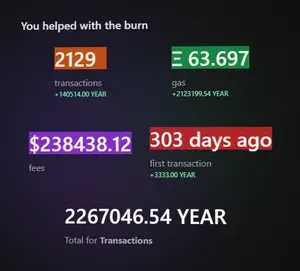Some of Tinyman's liquidity pools are drained of around $3 million
NFT collector loses $38,000 in what he believes is an OpenSea or Rarible glitch
Digiconomist reports that Bitcoin consumed about as much energy in 2021 as the whole country of Argentina
Tether, the stablecoin that claims to be fully backed by actual currency, adds $1 billion to their supply
Square Enix CEO acknowledges he will be disappointing gamers who "play to have fun" with his announcement that they are getting into web3
$YEAR creator rings in the New Year by rugpulling about $225,000
- "Airdrop culture could pose integral threat to DeFi industry", Cointelegraph
- "Ethereum Project Airdrops Scam Token, Then Pulls the Rug", Crypto Briefing
NFT collector scammed out of $2.2 million in a phishing attack
"I been hacked. all my apes gone." tweeted Kramer, in a phrase that ultimately became a catchphrase of the NFT world (and its critics).
After asking for help on Twitter, OpenSea froze the stolen assets, preventing them from being traded on their platform. Some commenters noted that the redress (asset freezing and flagging of suspicious accounts) was only possible because OpenSea is a centralized platform with a large amount of power in the NFT arena, which some see as antithetical to the supposed ideals of web3. This also raises the question of whether BAYC themselves have a way to determine "legitimate ownership" of their NFTs, which in addition to being expensive status symbols also grant their owners exclusive perks including merchandising rights and access to events.
p>








